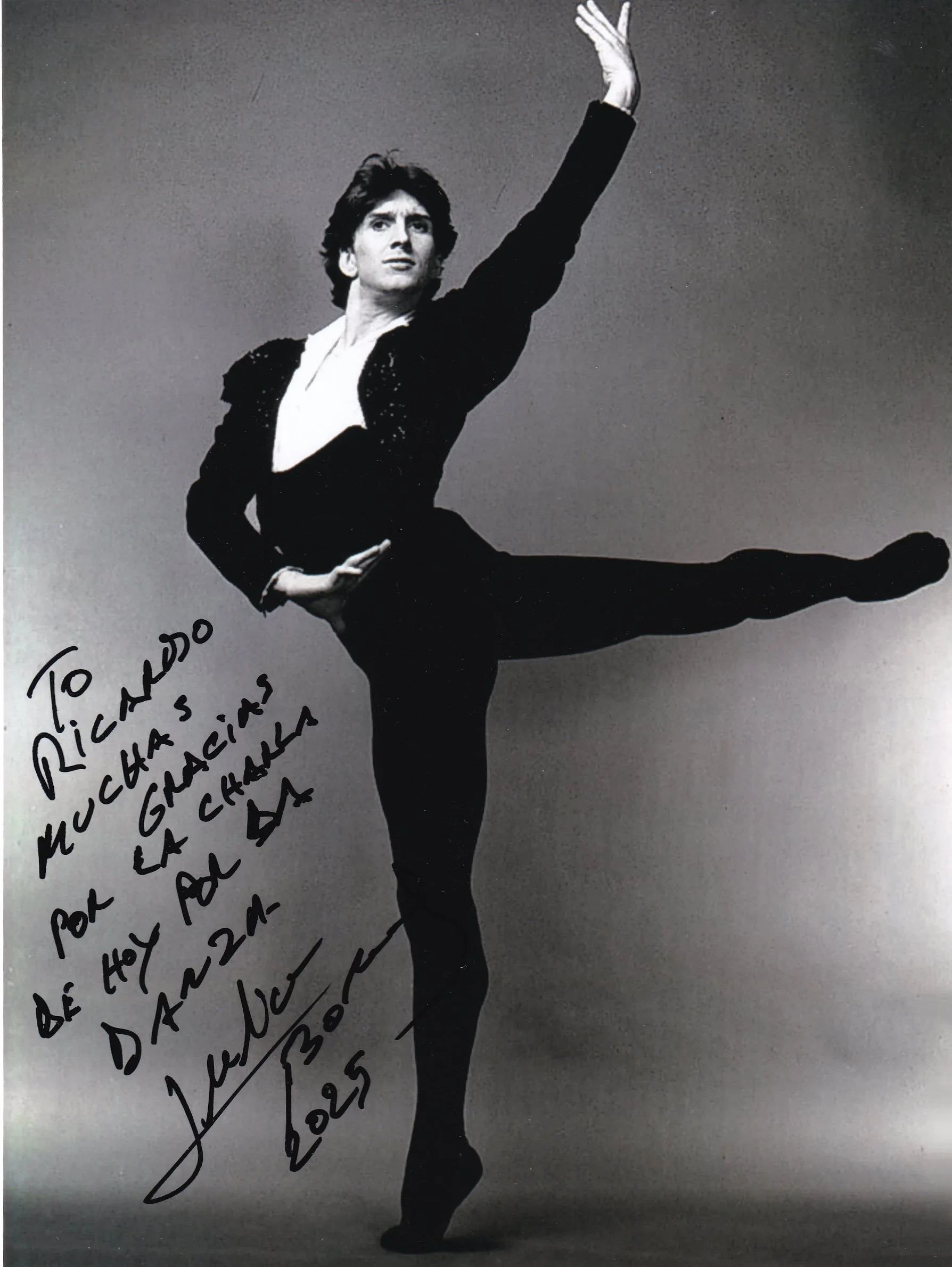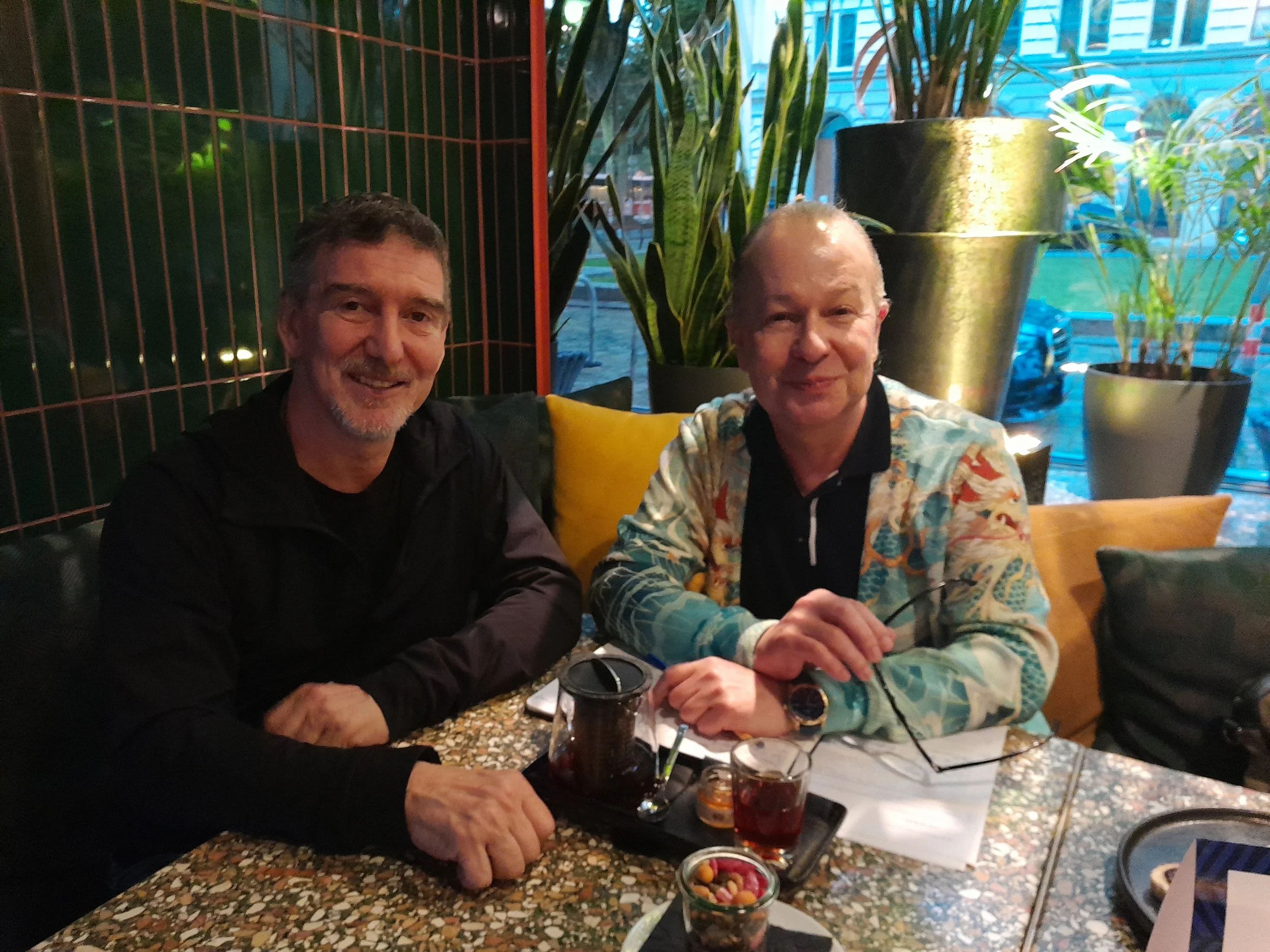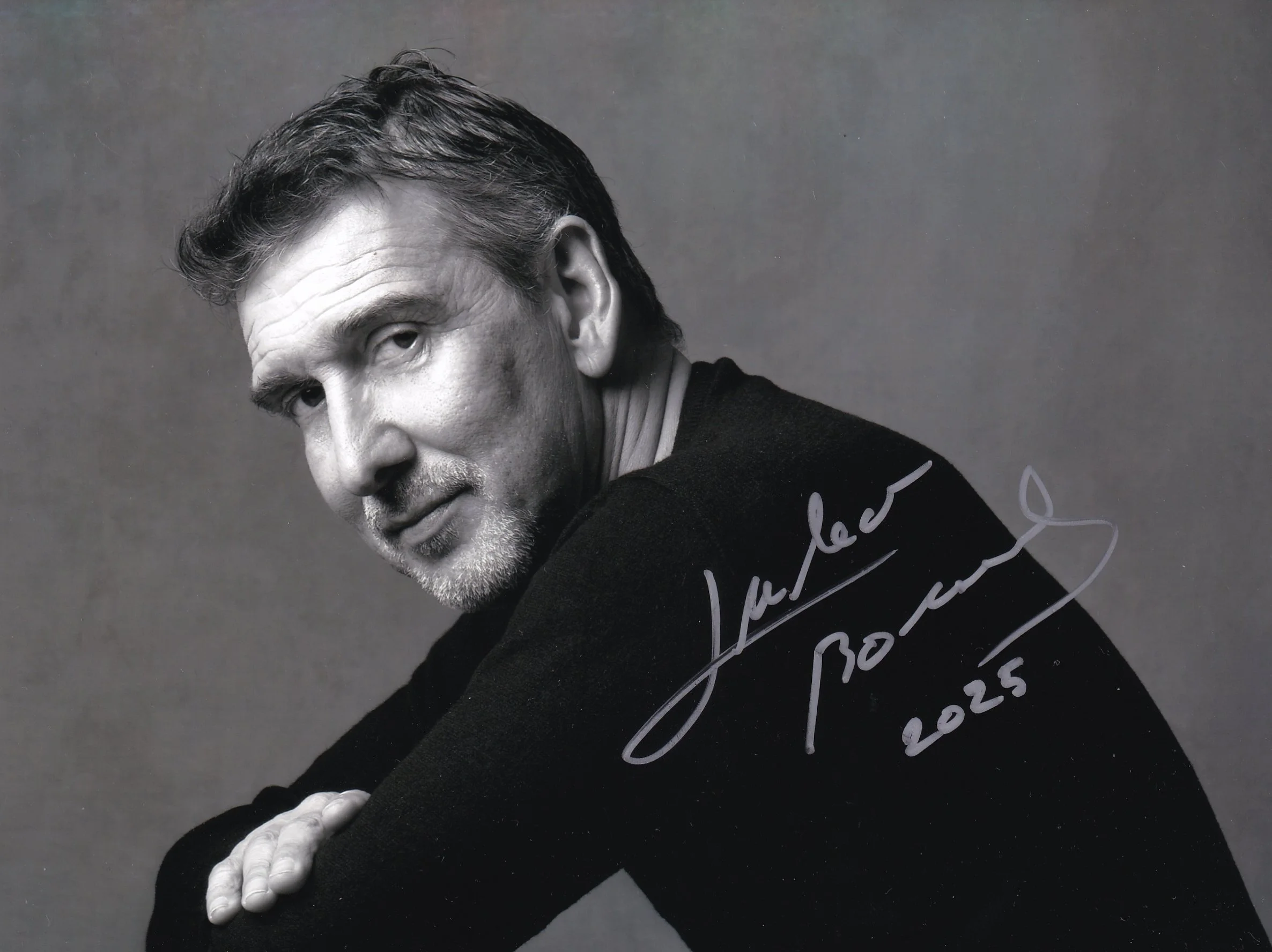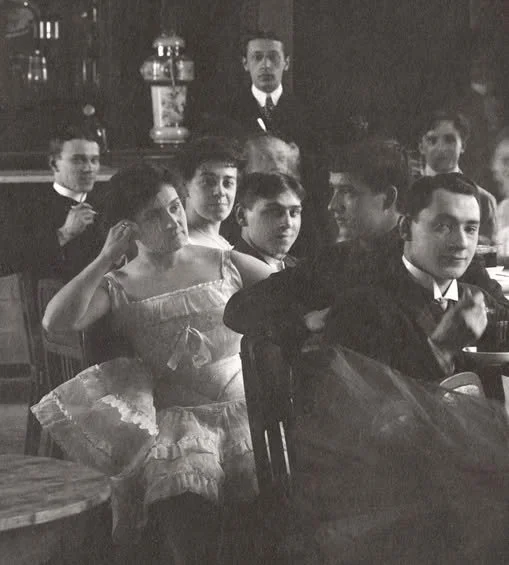Julio Bocca – Teatro Colón's (Buenos Aires) Artistic Director: An interview - Part 2 (September 10th, 2025)
Julio Bocca – Teatro Colón's (Buenos Aires) Artistic director and, at the present moment, coaching with Alessandra Ferri the Principal Dancers from this Season's first performances of „Giselle" under Miss Ferri's direction.
This is the second part of last week’s Interview with Alessandra Ferri.
You can read the first part of it by scrolling back to November 3rd.
„Thinking of the way you prepared for a role... Is it my impression, or do dancers nowadays prepare quite differently because of the way they look at the characters? Times have changed."
„Well,“ he pauses for a while, considering the question and pondering, „I think that you can't put them all in one basket. Of course, it's easier to copy than to create. Because this implies that there's work to be done. Being curious alone implies a lot of work. I always liked to have (and feel!) a kind of mystery while creating a new role. Of course, there is the factor „time" involved in this issue!"
„And while still talking about the creative process of discovering a role, a character, do you think that other Art forms – I mean, books, paintings, sculptures, films, plays and visits to museums, exhibitions and libraries – can be (very) helpful during this phase?
„Oh yes, definitely, and I hope that we are getting back to this kind of communication. On my part, I can give you one example. We are using different Artists to make something special on the programme covers, on the posters, but also with the whole publicity campaigns and merchandising. And I mean painters, not known and famous ones, even children. It's like a sort of „hook" to catch a new public – when you speak their own language, you can expect to be understood."
And I thought, „Yes, I see". In answering my question in a way that I could easily find it as „not an answer to what I asked", he showed me that everything in Art is connected. A much more universal answer than I had expected.
„Are there cultural issues that influence the creation of a role? Can it be different according to each country or continent? Are some members of the companies who are more „emotional" from the beginning of the rehearsals on, or is it only the way that they present it? After all, a mother, a lover, and a widower feel the same thing if in China, in Europe, Africa, or in the Americas, right?"
„I don't quite agree. I think that people feel things differently, depending on their cultural background (Note: „Cultural" is here meant as the „baggage" that you carry with you, depending on the country you were born into). Think, for example, of Mexico in comparison to Italy. Feelings, perception and the way of displaying them are completely different. There's quite a lot of work in reference to that in a ballet company, where dancers come from everywhere!
„I see“, I said, beginning to „see“ what he meant but not yet being quite sure...
„As we say in Argentina „Todo lo hacemos con alambre“ (Note: Or „Los atamos con alambre“, in English, „We tie it with wire“) is a very popular Argentinian expression, not much used elsewhere, that refers to solving a problem with the resources at hand, in a rather makeshift/cheap/quick way, but one that is effective in the moment and it fits very well the situation when you compare different countries, their different cultures, the form of taking, understanding things. It also means that we, in Argentina, are used to solving things at the very last minute, even improvising, and being ready for anything, which may sound quite unusual to Europeans, for example. Somehow this simple phrase confirms what I have just said before: I think that people feel things differently, depending on their cultural background. “
„Do you remember a particular moment in which coaching was extremely helpful to you? A moment in which it showed you the „way", the answer to your doubts, problems, or difficulties?"
„Yes, Ricardo, I remember it well. It was a rehearsal with MacMillan, and after realising my issue in a certain scene, he just told me, "Try to look at her, but don't really look at her - Look at her eyes, but go beyond them, behind her eyes, go beyond." he paused, " I'll never forget that!"
„I don't know that... When did you start coaching, Julio?"
„When I was the Artistic Director in Montevideo, between 2010 and 1017“
„I see/hear many dancers talking about the videos they watch on their phones to create a role. I remember times in which „mobile phones" were either seen on the cartoons „The Jetsons" or in Captain Kirk's hands in „Star Trek", remember?" I have to laugh, „When video recorders did not exist, and even so, Ballets had to be created, rehearsed, etc. When the Coached from „Hamburg Ballet" were here in Vienna, rehearsing Neumeier's „La Dame aux Camelias", they practically forbade the company from watching the video with Marcia Haydée. What do you think of that?"
„I understand that. They didn't want anyone to copy a performance. Although I think this word is not right. I'd rather say that they didn't want Marcia's performance to influence the spontaneity of new creations. And that's legitimate. That is why coaches come to a Theatre, to a company. To do just that. The coaches' duty is to continue the choreographer's philosophy. I remember „Other Dances" by Jerome Robbins. Misha (Baryshnikov) and Natascha (Makarova) were perfect and pinpointed in every detail. Others did it somewhat „differently" - that is also why it is so beautiful to be coached by the choreographer."
I cannot resist my curiosity. „You are smiling... Are You remembering anything you want to tell us?“
„You are right“, he laughs, „I was thinking of an episode that took me back to a „Swan Lake“ many, many years ago. There had been many injuries in the company (We didn't have that many Principal Dancers in the Companies on those days, and there was sort of a deficit of Principals), and Susanne Jaffe was suddenly without a partner for D.Q. As my name was mentioned, she said that she didn't think I'd be strong enough for the lifts. Of course, I heard about it.
Some time after that, I asked her to join me in the Studio.
When we were there, I said, “Let's do the lift, you know, the one that I am supposed to hold you up with one hand!” First, she hesitated a bit, but then agreed to „try“.
I lifted her and did not put her down“, he laughs, „and then asked her after a (very) long while and looking at her: “Now, do you think I am able to lift you?” We both exploded hysterically in laughter! Only after that, I put her down!“
„And how was this „Viennese experience“ for you? Tell us a bit more about working with Alessandra again and how you felt about the company – They're going through a new start... that for sure... „
„Amazing, I loved it! The way the Dancers took and reacted to my class. But it was not only this and this beautiful Opera House, the Company, the City, and the whole experience.
I could go on and on for hours telling you about the way I felt welcome here in the Company, from the first day on, as Alessandra introduced me to the Dancers and they took the first class. Everyone was working, very concentrated on everything I said, and wanting to hear more. After that, I started work with the Soloists, the Principals, Albrecht, Giselle, Hilarion, the Peasant's Pas de Quatre... It was really amazing to work with some dancers. The Company is incredible, and filled with plenty of beautiful Dancers. The whole atmosphere is so natural. And this is special. It is really amazing.
I enjoyed it a lot. But most of all, to witness how Alessandra directs the company was a real delight, the real „treat“! To see and „feel“ how she is in charge of it, of everything, and how she connects to the Dancers. This is also special. Yes, this was really the icing on the cake! I am very happy for her and , as I mentioned before, I hope I'll come back to Vienna more often to work with her and the Company!
To this I have a very short and direct answer, which I can only express as this: It would be just wonderful, and a big pleasure, Julio, to welcome such a professional of your „caliber“ in Vienna!
Ricardo Leitner
a t t i t u d e
September 12th, 2025
P.S. As I promised before, here is an Addendum. It's all about Julio Bocca.
Born in Greater Buenos Aires, he started ballet lessons at the age of four. He joined the National School of Dance at seven years and a year later, he entered the Teatro Colón's Advanced Arts Institute.
He joined the Chamber Ballet Company at the Teatro Colón in 1981 – he was only fourteen years old – and just one year later, he started performing as a soloist. In 1983, he worked at the Theatro Municipal in Rio de Janeiro/ Brazil. Then, in 1985, at just 18 years, he won the Golden Medal in the International Ballet Competition (as mentioned before) and was invited to the American Ballet Theatre by Baryshnikov, the youngest Principal ever to be hired by the Company.
As a Guest Artist, as he was allowed to dance with other Companies, as the Royal Ballet, Bolshoi Ballet, Kirov Ballet, Alla Scala of Milan, English National Ballet, Zarzuela Theatre of Madrid, Danish Royal Ballet, Opera Ballet in Oslo, Stuttgart Ballet, Paris Opera Ballet, Tokyo Ballet, National Ballet of Cuba, National Ballet of Madrid, Municipal Theatre of Santiago de Chile, Ballet Nuevo Mundo from Venezuela, Ballet Nacional de México, National Ballet from Cairo. He joined a tour with the National Ballet of Spain under the direction of Maya Plisetskaya and the Ballet of the Municipal Theater General San Martín,in Buenos Aires. For the opening of the Helsinki Opera House, Mr. Bocca was invited as a featured artist. He also performed in Poland, the Philippines, Israel, the United Arab Emirates, Greece, and Japan, as well as at the most important summer festivals in Europe and at the International Ballet Festival in Havana, Cuba, and the Peralada Festival.
We cannot forget the Artists with whom he also shared the stage: Some of the world’s leading exponents of his generation, such as: Natalia Makarova, Alessandra Ferri, Nina Ananiashvili, Carla Fracci, Cynthia Gregory, Cynthia Harvey, Alina Cojocaru, Paloma Herrera, Susan Jaffe, Julie Kent, Amanda McKerrow, Noella Pontois, Tamara Rojo, Viviana Durante, Heidi Ryon, Darcey Bussell, Ludmila Semeniaka, Cheryl Yeager, Mariana Tcherkassky, Arantxa Arguelles, and Ofelia Gonzalez many among others.
After a particular performance with the Royal Ballet, a very fitting comment was made in a review: „his irresistible combination of passion and gallantry“ - could there be a better description of this Dancer who told me quite honestly during our Interview, that „I just wanted to dance and dance, dance... „
In 1990, he created his own Company, „The Ballet Argentino“, whose repertoire also consists of contemporary, jazz, ballroom, and modern dance.
But his versatility does not stop at that: Surprisingly, in 2000, he appeared in „Fosse“, a Broadway Musical showcasing the work of the great Broadway/Hollywood dancer turned choreographer, and another idol of mine: Mr. Bob Fosse.
He said Farewell to his ABT career, after more than 20 years in the company, in 2006, dancing Kenneth MacMillan's „Manon“ with Alessandra Ferri.
One year later, he retired completely from dancing in a performance with his „Ballet Argentino“.
In 2010, he was named director of the Uruguayan „Ballet Nacional SODRE“ and directed the Company until 2017.
Ever since, he has been part of the Benois de la Danse’s jury (2017) and even presided over the Jury of the Prix de Lausanne in 2016.
Extremely loved in his Fatherland, his Farewell Event in Buenos Aires (there's no other way to call a performance in which the crème de la crème of the international and Argentinian Arts also appeared) had an estimated audience of 300.000 spectators.
Every time I think of that, I remember Christine Baranski presenting a documentary about Patricia MacBride during the Kennedy Center Honours Event, in which she compares the cult of the dancers from the New York City Ballet to the cult of „Pop Stars“.
I do believe that Mr Bocca was even closer to that.
Impressive!







